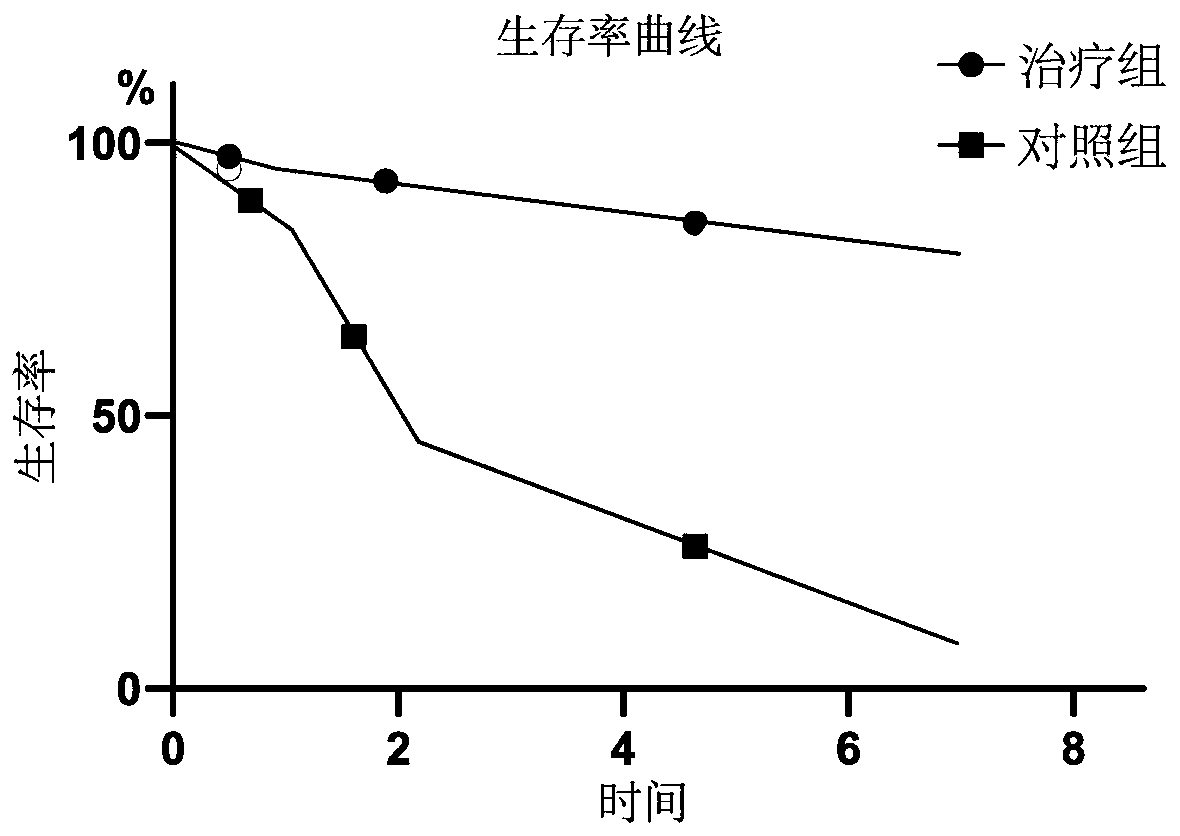Application of CTSG (cathepsin G) cell factor in preparation of medicaments to treat hepatic failure
A technology for liver failure and cytokines, applied in the fields of molecular medicine, biomedicine, and clinical medicine, which can solve the problems of death of patients and shortage of donor livers.
- Summary
- Abstract
- Description
- Claims
- Application Information
AI Technical Summary
Problems solved by technology
Method used
Image
Examples
Embodiment 1
[0042] Embodiment 1: Injection containing CTSG cytokines treats a large animal (young pig) model of liver failure
[0043] Animal model: 30 male Chinese young pigs (8-10 kg) were randomly divided into two groups, 15 in each group. Each young pig was injected with 1.5g / kg of D-gal via the jugular vein to create a liver failure model.
[0044] Test group: CTSG injection was intravenously injected multiple times at fixed time points after D-gal injection, dose: 10ml / kg, twice a day.
[0045] Control group: inject the same amount of normal saline without CTSG.
[0046] Neither the control group nor the experimental group received other drug treatment.
[0047] figure 1 It is a schematic diagram of the survival time curves of the young pigs of the experimental group and the control group, showing the survival rate of the young pigs of the experimental group and the control group. The results showed that the 3-day survival rate of young pigs in the treatment group containing CTS...
Embodiment 2
[0048] Embodiment 2: The lyophilized powder injection containing CTSG cytokine treats the small animal (rat) model of liver failure
[0049] Animal model: 100 male rats (200-250 g) were randomly divided into two groups, 50 in each group. Each rat was intraperitoneally injected with D-gal 1.5g / kg to make a liver failure model. The CTSG lyophilized powder and water for injection are prepared into a suspension.
[0050] Experimental group: 4 ml of CTSG freeze-dried powder suspension was injected intraperitoneally at a fixed time point after D-gal injection, twice a day.
[0051] Control group: inject the same amount of normal saline without CTSG.
[0052] Both the control group and the experimental group received no other drug treatment.
[0053] figure 2 Schematic diagram of the survival time curves of rats in the experimental group and the control group, figure 2 The survival rates of rats in the experimental group and the control group were shown: the results showed tha...
Embodiment 3
[0054]Embodiment 3: The suspension containing CTSG cytokine treats the rabbit model of liver failure
[0055] Animal model: 40 adult male rabbits (2000-2500 g) were randomly divided into two groups, 20 in each group. Each rabbit was intramuscularly injected D-gal 1.5g / kg to make a liver failure model.
[0056] Test group: intramuscular injection of 20 ml of CTSG suspension at fixed time points after D-gal injection, twice a day.
[0057] Control group: inject the same amount of normal saline without CTSG.
[0058] Both the control group and the experimental group received no other drug treatment.
[0059] image 3 It is a schematic diagram of the survival time curves of rabbits in the experimental group and the control group, image 3 The survival rate of the rabbits in the experimental group and the control group is expressed: the results show that the survival rate of the rabbits in the CTSG treatment group is 90% at 1 day, 90% at 7 days, and 90% at 14 days, while the co...
PUM
 Login to View More
Login to View More Abstract
Description
Claims
Application Information
 Login to View More
Login to View More - R&D
- Intellectual Property
- Life Sciences
- Materials
- Tech Scout
- Unparalleled Data Quality
- Higher Quality Content
- 60% Fewer Hallucinations
Browse by: Latest US Patents, China's latest patents, Technical Efficacy Thesaurus, Application Domain, Technology Topic, Popular Technical Reports.
© 2025 PatSnap. All rights reserved.Legal|Privacy policy|Modern Slavery Act Transparency Statement|Sitemap|About US| Contact US: help@patsnap.com



